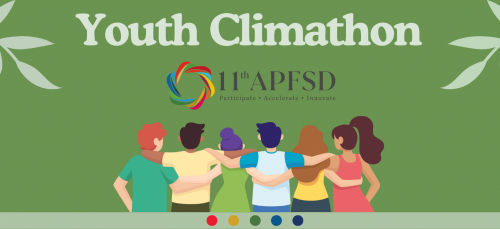
https://www.unescap.org/events/2024/youth-climathon-innovative-solutions...
Solutions will fall under the following categories:
- Electric mobility.
- Climate smart agriculture and food systems.
- Climate resilient/adaptive cities.
- Natural ecosystem preservation.
- Just transition.*
*The just transition refers to “Greening the economy in a way that is as fair and inclusive as possible to everyone concerned, creating decent work opportunities and leaving no one behind.”
Selected youth will be grouped into teams of three and tasked to develop their solution over the period of one week. Then, after a pre-selection process, the top three teams will move forward for a final selection process at the APFSD. The winning team will have the opportunity to present their solution at the APFSD exhibition, with the potential for other future opportunities. The climathon will be divided into two segments: online and in-person. This portion of the climathon will take place online over the course of two days as an initial kick off followed by preparatory workshop sessions for participants. Following this, participants will develop their solutions and submit them online. For more on the in-person pitching session at the APFSD following this online segment, see: Youth Climathon: Innovative solutions for the acceleration of climate action at the 11th APFSD- Final pitching session | ESCAP (unescap.org)
APPLY to participate by December 31, 2023
What will participants get?
- The opportunity to network and connect with peers from across the region.
- The opportunity to learn from experts.
- The chance to develop your own innovative solution.
- The opportunity to learn more about climate action, collaborative processes, and pitching.
- The finalist will have the opportunity to present to a panel of judges at the APFSD; the winner will present at the APFSD exhibition.
- Post-event support and opportunities may be provided to help further develop the solutions.
- All participants will receive a certificate.
For more details, see the concept note under the tab "DOCUMENTS."
Background
There is a growing recognition of the critical role that youth play in climate action. As highlighted in the youth statement presented at the 79th ESCAP Commission Session, youth across Asia and the Pacific are calling for more engagement in climate action and support for their development, including in implementing climate action solutions. Youth are in a strong position to drive solutions forward as they are in tune with the issues and developments of the present, are technologically savvy, and have the energetic, innovative, and disruptive approaches needed to accelerate climate action. As the recent United Nations Secretary-General policy brief on meaningful youth engagement in policy and decision-making processes points out “Youth are key to identifying new solutions that will secure the breakthroughs that our world urgently needs.”
Nowhere is this more applicable than in the Asia-Pacific region. Asia and the Pacific is home to many of the countries that are most vulnerable to climate change and is home to over half of the global youth. It is also the largest emitter of greenhouse gases. While progress needs to be accelerated for all the 17 Sustainable Development Goals (SDGs) to be met by 2030 in Asia and the Pacific, only SDG 13 on climate action has seen an overall regression in progress, according to ESCAP’s SDG Gateway. Limited decarbonization and green growth across sectors, inefficient food systems, mounting losses due to natural disasters, and continued deforestation and other forms of ecosystem degradation are some of the major reasons for the poor progress. Additionally, a lack of engagement across the whole of society stands as a major challenge. Thus, international cooperation and collaboration is mentioned in the Secretary-General's Climate Action Acceleration Agenda, which would also entail region-wide engagement of youth in climate action for a sustainable future. Fortunately, societies are already leveraging the presence of large young populations, but more needs to be done.
The 11th Asia-Pacific Forum on Sustainable Development (APFSD)—held from 20-23 February 2024—will examine the multiple crises of poverty, food security, and climate change in the region and their relationship to each other. The APFSD is an annual, inclusive intergovernmental forum to support follow-up and review of progress on the 2030 Agenda for Sustainable Development and the Sustainable Development Goals and presents an ideal opportunity to bring innovative youth solutions on climate action forward to a diverse regional audience.









